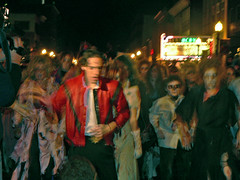A photo of a package that Betsy and I found in Cracker Barrel a couple of weeks ago. In case you needed any steaks.
No mas Ads
You’ll notice that the Google Ads are no longer on my sidebar…I didn’t mind them, until an ad popped up for Intelligent Design.
*shudder*
Can’t abide my blog being used for advertising that. Maybe I’ll try again later with something that I can choose a bit more wisely.
More Blaise
From Jessamyn, over at librarian.net:
More on the Blaise Cronin/blogger back and forth. Apparently the story of Cronin’s lambasting from the blogger community has taken on legs of its own and is quoted in this Christian Science Monitor article about anonymity.
Funny…my lambasting from back in April has my name right at the top. Fancy that.
Become a Commoner
I’ve added a couple of image links to my sidebars in support of the Creative Commons fundraising effort…they are trying to raise $250K before Dec 31st, and are 1/5 or so of the way there. If you do any giving over the holiday season, this is a great cause to give to, since their work benefits everyone by making information and media easier to access. So if you’ve got $5, send it along to Creative Commons.
Mechanical Turk
Amazon just put out a really interesting new feature that they are calling the Amazon Mechanical Turk. It’s named after a famous fake mechanical man from the 1800’s that played chess against (and defeated!) both Benjamin Franklin and Napolean Bonaparte.
Basically, they are leveraging the fact that humans are the best pattern recognition machines coming or going, and are paying small amounts for identification of object that computers just have a hard time with. Show a computer two pictures, and ask “Which one is the better picture of this Starbucks?” and you’ll be waiting a long time…whereas, a human can do that in less than a second. This gives Amazon the ability to create large amounts of metadata that they can then leverage in other ways.
All in all, it’s brilliant. The execution is somewhat clumsy, but it’s a different attempt at capturing distributed information generation (ie wikipedia et al). I adore their tagline though: “Artificial artificial intelligence” 🙂
My Pet Zombies
Oh BoingBoing, how you taunt me so.
These would make a lovely Christmas or Birthday present to a certain blog writing zombie fan. Of course, they’d probably freak Betsy out something fierce, but it would be AWESOME to have two or three (dozen) of these in the basement, and conveniently forget to tell someone when they went down to grab the mop.
Bluegrass Zombie Action
Evidently, every year in Lexington, there is a group that gets together on Halloween and re-creates Michael Jackson’s video Thriller.
Why?
Who knows.

All I know is that zombies + Lexington is teh hawt.
Note the movie theatre marquee in the picture…that’s the Kentucky Theatre, where I spent many a teenage evening watching films of all sorts, from the Blade Runner director’s cut to Fritz the Cat. Makes me miss the bluegrass.
Ah….Usenet
Inspired partially by this post of Walt’s, I decided to see what I could find as my oldest record of being on the web. Looks like it’s this post to bit.listserv.new-list when I set up the first email listserv for the state of Kentucky’s academic honors programs.
Date? Oct 27 1992. So that means, if we take this as my first moment online, that I just passed my 13th anniversary of the ‘net. Of course, this was posted from Bitnet and not the Internet, and I was on long before this, but it’s still an interesting look back. I’ve checked the Wayback machine to see if they had captured any of my old original homepages, but it doesn’t look like it. *sigh* The sorts of things you don’t think will be important…I’d love to see some of that stuff. I wrote my first webpage on emacs, across a dumb terminal, BEFORE Mosaic…just text and hyperlinks. It was the coolest thing in the world. That would have been sometime in ’92, I think. I also had a homepage on a old ISP in Athens, OH when we moved there in 1996 or so called frognet.net. Can’t seem to find that either.
Ah well…interesting to think of being on the nets for so long, and that now they are literally just part of my daily life. What’s anyone else’s earliest web presence?
Happy Halloween!
Had a pretty quiet halloween here on the homefront. Only one trick or treater, a mini-spiderman. We spent the rest of the evening watching Dawn of the Dead and drinking hot chocolate. All in all, not the night of debauched trickery that some may have had, but an ok evening for us.
Next year, though: party!
NB: This is a copy of the post I put together for the UTC Library blog, but I felt it was important enough that I wanted to cross post it. Forgive me the horrific blog ettiquette faux pas.
Completely and utterly brilliant keynote at the ACA Summit by Jo Ellen Parker, tracing the changes in the University in the 1860’s through the early 20th century and comparing them to the sea change coming over the next 20-30 years via technology.
As a teaser: her central point, among many phenomenal side points, was that the University will be moving towards a less centralized/compartmentalized model, and towards a more fluid, changable model. One of her questions was, paraphrased: “What happens when the library is no longer a place where information is stored, and is instead a method or activity?”
EDIT: Snippets from actual text follows…Jo Ellen Parker was kind enough to share her early draft with me, and here are some of the high points. The first exerpt is her illustration of another major shift in the Academy, when writing allowed education to move from the “seek a teacher, and listen” mode to “learning anytime, anywhere” mode.
…in the Phaedrus, where Plato depicts Socrates and Phaedrus talking a walk and talking of love and truth. Socrates tells Phaedrus a story about the Egyptian god Theuth, who presents various “divine†arts to the king Thamus – number, calculation, geometry, astronomy, and above all writing. Thamus is less than impressed, however, about writing in particular, saying “If men learn this, it will implant forgetfulness in their souls; they will cease to exercise memory because they rely on that which is written, calling things to remembrance not from within themselves but by means of external marks. . . . And it is no true wisdom that you offer your disciples, but only its semblance, for by telling them of many things without teaching them you will make them seem to know much, while for the most part they know nothing. . . “ After Phaedrus agrees that Thamus has a point, Socrates goes on to say that “anyone who leaves behind him a written manual, and likewise anyone who takes it over from him, on the supposition that such writing will provide something reliable and permanent, must be exceedingly simple-minded.†Written words “seem to talk to you as though they were intelligent, but if you ask them anything about what they say, from a desire to be instructed, they go on telling you the same thing forever.†In Socrates’ view, a book is a sort of inanimate parrot, mindlessly repeating a form of words of which it can have no understanding.
[. . . ]
Of course, Socrates speaks more principled objections as well. By relying on writing to preserve information, the argument goes, students would cease to exercise memory. (I seem to remember many similar discussions about the introduction of calculators and their effect on basic math skills in my own education.) But most serious of all seems to be the charge that books are “dead.†They can only repeat themselves, without interaction or nuance or growth, and so are a poor substitute for the live interplay of human minds through discourse, which in the Socratic view is the true mode of intellectual seeking. As I think about this point, I have to wonder whether Socrates would have found blogs and wikis, with their ever changing nature and open invitation to exchange, somewhat less objectionable than Greek scrolls. . . .
She goes on to discuss the changes in the American university before and at the turn of the 20th century. Within a roughly 40 year period, most of the things we take for granted about academia were invented or imported: the necessity of the PhD, tenure, universities as knowledge production facilities, the academic publishing model and specialization over generalization of learning. All of these things came into being in a terrifically short time, and one can only imagine the shock of the existing college professor in trying to hang on to the old ways of doing things.
I’ll close this with her paragraph on libraries…again, very forward thinking.
And, to bring us back to where we started, sort of, I believe that something similar will happen, indeed is happening, to libraries. James Duderstadt, former president of the University of Michigan and a very thoughtful commentator on higher education, poses a nice thought experiment: Imagine that all the information currently in your campus library could be contained in a device roughly the size and shape of a football. What would that mean for your library? One thing it would mean, obviously, is that the definition of the library as a physical space built to centralize and protect collections must be radically changed. Once regarded as repository of an institution’s accumulated intellectual and informational capital, the library must become an access point for information and materials, both digital and analog, owned by many different entities and located who knows where. What does a library look like that is a launching pad into cyberspace for students and faculty? What kinds of skills do librarians need to connect users with information in multiple media from anywhere on the globe? To put it really bluntly, how can your college librarian compete with Google to provide services to NetGen students and very soon NetGen faculty? Another prediction I have is that just as the barriers between disciplines and departments will become permeable and flexible, the distinction between library and student center, library and technology center, library and classroom will do the same.


